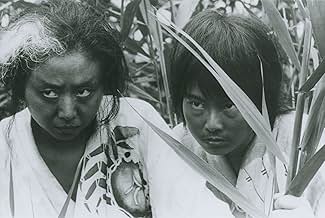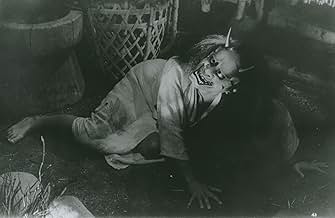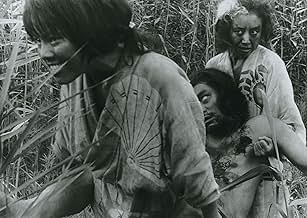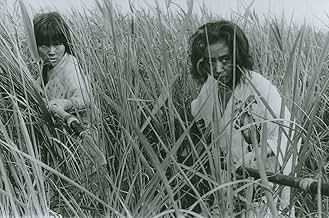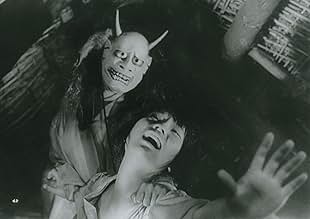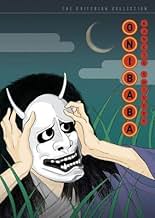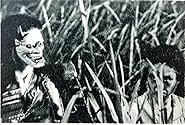Due donne uccidono i samurai e vendono i loro averi per vivere. Mentre uno di loro ha una relazione con il vicino, l'altra donna incontra un misterioso samurai che indossa una maschera bizza... Leggi tuttoDue donne uccidono i samurai e vendono i loro averi per vivere. Mentre uno di loro ha una relazione con il vicino, l'altra donna incontra un misterioso samurai che indossa una maschera bizzarra.Due donne uccidono i samurai e vendono i loro averi per vivere. Mentre uno di loro ha una relazione con il vicino, l'altra donna incontra un misterioso samurai che indossa una maschera bizzarra.
- Regia
- Sceneggiatura
- Star
- Premi
- 2 vittorie totali
Recensioni in evidenza
In the 1400s raging wars between two emperors is being fought. This is not about the wars, but about the poor people struck by it. In a rural location camouflaged by a huge field of tall reeds are two huts. In one of them a young woman lives with her stepmother, her husband went to war. Having had failed crops three times that year they are stricken by poverty. The only way for them to survive is to steal, and the only things to steal are uniforms and swords from dead soldiers or heavily wounded soldiers and then sell them to the underworld. Which by the way is funny, I never thought of the underworld in rural medieval setting before.
This story is just as grim as the demon on the cover. The wind howling in the reeds make for very creepy atmosphere. The music consisting of drums and brassy wind instruments really intensifies the drama.
Just as in sand in Teshigaharas equally excellent 'Suna no Onna' serves as symbol, metaphor and is very important in creating atmosphere we have in 'Onibaba' the tall reeds.
The theme in this, the basic needs and emotions of people, will never be dated. The psychology is thick and real. They are victims of their leaders actions. With all the wars being fought today this is still happening today, please remember that.
This story is just as grim as the demon on the cover. The wind howling in the reeds make for very creepy atmosphere. The music consisting of drums and brassy wind instruments really intensifies the drama.
Just as in sand in Teshigaharas equally excellent 'Suna no Onna' serves as symbol, metaphor and is very important in creating atmosphere we have in 'Onibaba' the tall reeds.
The theme in this, the basic needs and emotions of people, will never be dated. The psychology is thick and real. They are victims of their leaders actions. With all the wars being fought today this is still happening today, please remember that.
Director Kaneto Shindo's ONIBABA is a fantastic, rich, atmospheric horror film set in an amazing rural location. Its influence on decades of rural-set genre pics is undeniable.
In a medieval, warring Japan, a wild, young woman and her mother-in-law rob and kill lost samurai in order to survive. Problems begin when the younger woman becomes involved with an intended victim.
Staged in a rural world of tall, swaying grass and swollen rivers, the film contains little dialogue and little exposition. It relies heavily on the non-verbal performances of the female leads and the superbly conveyed location.
It is erotic, creepy, sensual, savage and beautiful.
Cinematic poetry.
In a medieval, warring Japan, a wild, young woman and her mother-in-law rob and kill lost samurai in order to survive. Problems begin when the younger woman becomes involved with an intended victim.
Staged in a rural world of tall, swaying grass and swollen rivers, the film contains little dialogue and little exposition. It relies heavily on the non-verbal performances of the female leads and the superbly conveyed location.
It is erotic, creepy, sensual, savage and beautiful.
Cinematic poetry.
While not the greatest Japanese movie ever made, this proves that you don't need Akira Kurasawa to direct an excellent Japanese film.
"Onibaba" is Japanese for "grandma-monster" and this refers to a story the older woman tells the younger in order to get her to stay home and stop carrying on her affair with a ne'er-do-well. Unfortunately, when the older lady dresses up AS the monster in order to scare her, things change for the worse unexpectedly.
Despite this brief description, this isn't really a horror movie, but a tale about three basically greedy people. So what did I like about it? Well, the story has such interesting twists and turns that keep the viewer guessing and it is a good study of human nature in its worst form. Overall, very odd but captivating.
"Onibaba" is Japanese for "grandma-monster" and this refers to a story the older woman tells the younger in order to get her to stay home and stop carrying on her affair with a ne'er-do-well. Unfortunately, when the older lady dresses up AS the monster in order to scare her, things change for the worse unexpectedly.
Despite this brief description, this isn't really a horror movie, but a tale about three basically greedy people. So what did I like about it? Well, the story has such interesting twists and turns that keep the viewer guessing and it is a good study of human nature in its worst form. Overall, very odd but captivating.
Onibaba is a supernatural horror film based on a Buddhist fable. It's about a couple of women in feudal Japan surviving the hardships of war by murdering and robbing stray samurais who wander unwittingly into their path. Their domain is a huge field of tall reeds with an ominous deep hole at its centre where they dispose of the unfortunate men they kill. Things are complicated when a male neighbour returns from the war and unleashes sexual tensions within the women which ends in horror. And that is to say nothing of the demon mask...
Onibaba is an artistically strong piece of cinema. From the outset the film is aurally intense, with repetitive beating drums announcing the beginning of the tale. The widescreen frame is consistently used brilliantly, with beautifully lit black and white photography. From the constantly swaying reeds to the close-ups of the protagonist's faces, the visuals capture the mysterious yet ominous beauty of the natural world, while emphasising the intense emotions of the protagonists. The setting ensures that the atmosphere is one of claustrophobia. In fact one of the themes of Onibaba is the way that the natural landscape can shape the way we are. The field of reeds allows the women to get close enough to kill warriors; it is one of the things that shapes them into killers, as it allows them to murder at will undetected. Similarly, the film is an allegory on capitalism. The war has forced these starving women to find their own way to survive the hardships all around them. They take extreme measures to feed the capitalist machine, as they murder and sell on that which they steal to a local low-life. Capitalism has dehumanised them and the black hole in the centre swallows up the victims. But aside from this, it is an intense human drama intertwined with eerie supernatural horror. The scenes near the end of the film with the demon in the reeds are beautifully creepy. While the horrific curse of the mask results in some scary and disorientating final scenes. In addition, there is a powerful depiction of female sexuality. These women are no shrinking violets. They are aggressive, amoral and deadly.
Onibaba is a film that is sumptuous both visually and aurally; yet its characters and story are devoid of beauty. It's one of the best examples of a horror art film.
Onibaba is an artistically strong piece of cinema. From the outset the film is aurally intense, with repetitive beating drums announcing the beginning of the tale. The widescreen frame is consistently used brilliantly, with beautifully lit black and white photography. From the constantly swaying reeds to the close-ups of the protagonist's faces, the visuals capture the mysterious yet ominous beauty of the natural world, while emphasising the intense emotions of the protagonists. The setting ensures that the atmosphere is one of claustrophobia. In fact one of the themes of Onibaba is the way that the natural landscape can shape the way we are. The field of reeds allows the women to get close enough to kill warriors; it is one of the things that shapes them into killers, as it allows them to murder at will undetected. Similarly, the film is an allegory on capitalism. The war has forced these starving women to find their own way to survive the hardships all around them. They take extreme measures to feed the capitalist machine, as they murder and sell on that which they steal to a local low-life. Capitalism has dehumanised them and the black hole in the centre swallows up the victims. But aside from this, it is an intense human drama intertwined with eerie supernatural horror. The scenes near the end of the film with the demon in the reeds are beautifully creepy. While the horrific curse of the mask results in some scary and disorientating final scenes. In addition, there is a powerful depiction of female sexuality. These women are no shrinking violets. They are aggressive, amoral and deadly.
Onibaba is a film that is sumptuous both visually and aurally; yet its characters and story are devoid of beauty. It's one of the best examples of a horror art film.
Life's been tough, and you're surviving on the edge, trapping Samurai from flows in which you dredge, your often empty skillet, is sometimes, filled with millet, but at least your daughter in law helps you fetch. A neighbour returns home, with some bad news, your son, fallen in battle, no longer moves, it's not long before his wife, is causing stress, struggle and strife, behaving in a way you wholly disapprove. By fortune, you obtain a Hannya Mask, it comes in handy for a demonising task, a barrier of sorts, daughter in law's trips cut short, but there's no time to enjoy pleasures, or to bask.
Nobuko Otowa provides us with a truly outstanding performance as she grapples with her daughter in law's infidelity after the loss of her husband, leaving her isolated, alone and forgotten. The cinematography is sublime, the raw emotions unrefined, and the mask a cursed damnation that sticks and binds.
Nobuko Otowa provides us with a truly outstanding performance as she grapples with her daughter in law's infidelity after the loss of her husband, leaving her isolated, alone and forgotten. The cinematography is sublime, the raw emotions unrefined, and the mask a cursed damnation that sticks and binds.
Lo sapevi?
- QuizOnibaba's literal meaning is demon hag or old devil woman.
- BlooperThe orientation of how Hachi holds his spear while talking to the young woman and the old woman changes from cut to cut. At times he has his arm extended and other times his elbow is bent.
- Versioni alternativeOriginally cut in England when released in 1968, though the video releases are uncut.
I più visti
Accedi per valutare e creare un elenco di titoli salvati per ottenere consigli personalizzati
- How long is Onibaba?Powered by Alexa
Dettagli
Botteghino
- Lordo in tutto il mondo
- 689 USD
- Tempo di esecuzione1 ora 43 minuti
- Colore
- Mix di suoni
- Proporzioni
- 2.35 : 1
Contribuisci a questa pagina
Suggerisci una modifica o aggiungi i contenuti mancanti



